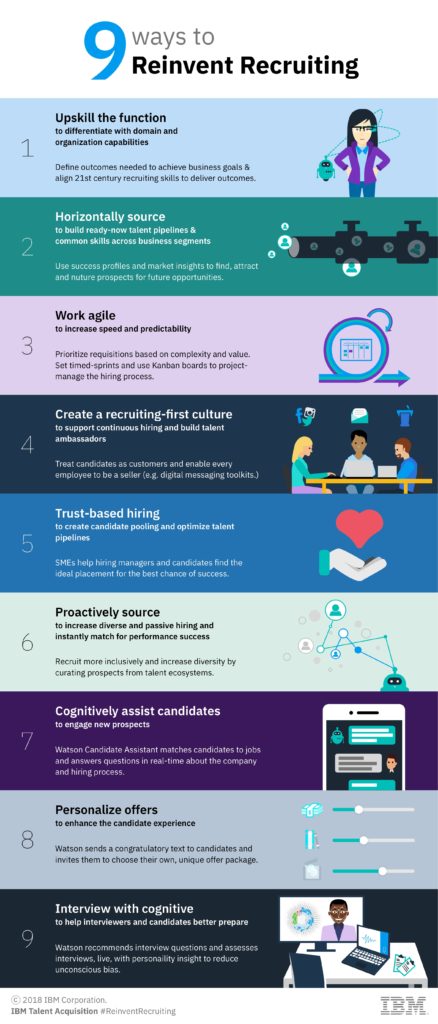Amber Grewal is the Head of Global TA for IBM. It’s a big job. She posted on LinkedIn recently and gave her 9 ways IBM is reinventing recruiting. It’s pretty good. I’m not sure she wrote it. My experience is with giant corporations that they rarely would ever allow one person to post something so big on a social platform, but I’m sure she got in her ideas with some ‘corporate’ wordsmithing, either way, I liked it.
I like when large organizations put HR and TA leaders out in front of the brand. That’s always a risk. I like that IBM is taking that risk. They’re a big player in the HCM/TA tech space, and if you want my attention, give me less PR and marketing pitches, and more practitioner know-how!
Here is the infographic that “Amber” put together:
I’ll go through and give you my comments on all 9:
1. Upskill the Recruiting Function – Oh hell yes! The main problem with corporate recruiting is very little actual recruiting actually takes place. A whole lot of administering the recruiting function takes place. When need to flip those two things!
2. Horizontally Source – This is the Talent Pipeline. The problem with maintaining Talent Pipelines is they’re very expensive. I would rather see an On-demand sourcing function, than a pipeline function, but I like that Amber to be trying to marry the two in a ‘ready-now’ fashion.
3. Work Agile – I think what Amber is saying, and I love it, is not all requisitions are created equal. Some jobs we fill are more important and have more impact on the organization. Yes, yes they do! So, do those things first and do them fast, to maximize the impact!
4. Create a Recruiting-First Culture – This would be my #1. Talent Acquisition doesn’t own recruiting. Hiring managers own recruiting. I can help you staff your department, function, location, etc., but ultimately, you as the leader must own it. If you can get here in your organization, you’ll be great at talent acquisition. The next step is then getting every single employee to understand their role and significance in constantly attracting talent to the organization.
5. Trust-based Hiring – Yeah, I’ve got nothing. Honestly, this is a large, enterprise-level organizational issue. Here’s what happens. Manager A has a great talent, but that talent is being underutilized in their group. Manager B desperately needs the talent Manager A has. Manager A should, for the betterment of the organization, give up their talent to Manager B, but they don’t because they believe they won’t get the talent they need in return. This happens constantly in giant organizations, and it sucks.
6. Proactively Source – Maybe a good first step here would be to first ‘actually’ source! 😉 I like that Amber is focusing her team on certain things the organization needs. Hey, we suck at hiring females in tech roles! Cool, let’s make that a priority and specifically use a rifle approach to go out and get more females in tech roles. That’s just good recruiting. Might want to work with HR to ensure those females will feel like they actually belong as well, when they get into those roles or you’ll never get off that treadmill.
7. Cognitively Assist Candidates – Thanks for joining Marketing! This is where an LI post becomes a commercial and I would bet my entire salary (as a writer) that Amber didn’t actually have this on her original list! This one is supposed to be about Candidate Experience and I’m sure that’s what Amber had, but this is where Watson got shoved in. Not saying that’s bad, but it doesn’t sound like a practitioner put #7 together.
8. Personalize Offers – More Watson, but I will say personalization across the recruiting process is the key to reinventing recruiting. We all want to be recruited like a five star running back to Alabama. We want that experience. It doesn’t matter what role you get hired for, you want to feel like the most important person in the world to that company.
9. Interview with Cognitive – Okay, more Watson, but this is where I’m a huge fan! Very, very, very rarely will you go wrong when hiring smarter people who can process information faster. This doesn’t mean hiring only people who have a GPA of 3.5 or higher. There isn’t a ton of correlation between GPA and actual cognitive processing speed. Go find great cognitive pre-employment assessments and hire smart, it won’t let you down. Apparently, IBM has something like this called Watson or something, check it out.
Amber, thanks for putting this together! It’s a really strong plan for other TA leaders to follow!

